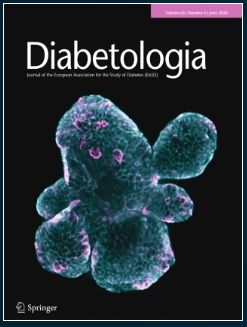重复粪便菌群移植治疗1型糖尿病和胃肠病患者。
IF 10.2
1区 医学
Q1 ENDOCRINOLOGY & METABOLISM
引用次数: 0
摘要
目的/假设最近的一项安慰剂对照试验表明,粪便微生物群移植(FMT)可以缓解糖尿病胃肠炎患者的胃肠道症状。在大多数参与者中,症状缓解是短暂的,增加了重复治疗的需要。本研究评估了在该患者群体中重复按需FMT作为维持治疗的长期疗效、安全性和可行性。方法20例随机临床试验患者均接受FMT延长开放标签治疗。采用肠易激综合征胃肠道症状评定量表(GSRS-IBS),每2-3个月进行一次症状电话评估。次要测量包括排便频率、使用布里斯托大便量表评估的大便一致性、7分李克特量表的感知治疗获益和不良事件(ae)。FMT主要以口服胶囊的形式给予,对不能吞咽胶囊的参与者进行结肠镜检查。在最初的20名参与者中,有17人被纳入本研究,随访时间为2021年9月至2024年12月,中位随访时间为33.2个月(14.7-39.1个月)。参与者共接受了95次FMT治疗,每位参与者的中位数为5次,治疗之间的中位数间隔为5.3个月。FMT诱导了一致的症状缓解,多种治疗均降低了GSRS-IBS评分。在最后一次提供FMT治疗时,平均gsr - ibs评分从基线时的60 (95% CI 54,66)下降到35 (95% CI 29,40),平均差异为-25 (95% CI -18, -33)。治疗2周后频繁排便的发生率(每天7次)从19% (95% CI 10%, 28%)下降到3% (95% CI 0%, 7%)。治疗后大便一致性改善,正常大便类型(Bristol Stool Scale评分3-5)的频率从28% (95% CI 18%, 39%)增加到76% (95% CI 66%, 86%)。参与者的满意度很高,86%的人报告了可观的收益(李克特得分为5-7)。重复FMT通常耐受性良好,大多数ae是轻度和自限性的。记录了15例严重ae,其中只有1例被认为可能与FMT有关。结论/解释重复、按需FMT对于1型糖尿病和严重糖尿病性胃肠病患者的长期治疗是有效和安全的。资助:本研究由Steno合作资助(no. 4749030)资助。0058906)。本文章由计算机程序翻译,如有差异,请以英文原文为准。
Repeated faecal microbiota transplantation for individuals with type 1 diabetes and gastroenteropathy.
AIMS/HYPOTHESIS
Faecal microbiota transplantation (FMT) may alleviate gastrointestinal symptoms in individuals with diabetic gastroenteropathy, as demonstrated in a recent placebo-controlled trial. In most participants, symptom relief was transient, raising the need for repeated treatments. This study assessed the long-term efficacy, safety and feasibility of repeated, on-demand FMT as a maintenance treatment in this patient population.
METHODS
All 20 participants from the randomised clinical trial were offered extended open-label treatment with FMT. Symptom assessments were conducted by telephone every 2-3 months using the Gastrointestinal Symptom Rating Scale for Irritable Bowel Syndrome (GSRS-IBS). Secondary measures included bowel movement frequency, stool consistency assessed using the Bristol Stool Scale, perceived treatment benefit on a seven-point Likert scale, and adverse events (AEs). FMT was primarily given as oral capsules, and colonoscopy was used for participants who could not swallow capsules.
RESULTS
Of the original 20 participants, 17 were included in the present study and followed from September 2021 to December 2024, with a median Duration of follow-up of 33.2 months (range 14.7-39.1 months). Participants received a total of 95 FMT treatments, with a median of five per participant and a median interval of 5.3 months between treatments. FMT induced consistent symptom relief, with reduced GSRS-IBS scores across multiple treatments. At the last FMT treatment provided, the mean GSRS-IBS score had decreased from 60 (95% CI 54, 66) at baseline to 35 (95% CI 29, 40), with a mean difference of -25 (95% CI -18, -33). The occurrence of frequent bowel movements 2 weeks after treatment (> 7 per day) decreased from 19% (95% CI 10%, 28%) to 3% (95% CI 0%, 7%). Stool consistency improved after treatment, and the frequency of normal stool types (Bristol Stool Scale score 3-5) increased from 28% (95% CI 18%, 39%) to 76% (95% CI 66%, 86%). Participant satisfaction was high, with 86% reporting considerable benefits (Likert scores 5-7). Repeated FMT was generally well tolerated, with most AEs being mild and self-limiting. Fifteen serious AEs were documented, of which only one was deemed to be possibly related to FMT.
CONCLUSIONS/INTERPRETATION
Repeated, on-demand FMT is effective and safe for long-term treatment of individuals with type 1 diabetes and severe diabetic gastroenteropathy.
TRIAL REGISTRATION
ClinicalTrials.gov NCT04749030 FUNDING: The study was funded by a Steno Collaborative Grant (no. 0058906).
求助全文
通过发布文献求助,成功后即可免费获取论文全文。
去求助
来源期刊

Diabetologia
医学-内分泌学与代谢
CiteScore
18.10
自引率
2.40%
发文量
193
审稿时长
1 months
期刊介绍:
Diabetologia, the authoritative journal dedicated to diabetes research, holds high visibility through society membership, libraries, and social media. As the official journal of the European Association for the Study of Diabetes, it is ranked in the top quartile of the 2019 JCR Impact Factors in the Endocrinology & Metabolism category. The journal boasts dedicated and expert editorial teams committed to supporting authors throughout the peer review process.
 求助内容:
求助内容: 应助结果提醒方式:
应助结果提醒方式:


